Shared experiences
It was a great pleasure to share the next couple of weeks of my trip with two close friends; first one and, soon after, a second appeared in the Austrian countryside. And together, we headed east, the pull of Vienna almost tangible. I felt somewhat proprietorial as I showed off the Danube’s glories, as we headed into the Wachau region: proud and curious.
The festivities had begun with a makeshift, riverside picnic of bread, ham, and cheese on the banks of the Danube, a little ways off from the nearest town of Ybbs: just the two of us, under the vail of a cloudy night, navigating the riverside wooden pier by torchlight.
We stopped in the early afternoon the next day at a café in Pöchlarn. We sat, bathing in a sun-soaked square; coffee progressed naturally to a course of Zwickelbier (an unfiltered, local iteration) and mojitos — as is the way with these things. Just outside the town, a Nibelungen monument had been erected, complete with the various coats of arms of the Nibelungen towns and cities. The Nibelungen Saga, most notably told through the 13th Century Middle High German epic poem Nibelungenlied (or Song of the Nibelungens), is an ancient, heroic tale which tells of a Burgundian king and the migration of peoples. It is a mystery that I have elided mention of this tale until now, given its inextricable links to my route thus far. Worms, for example, back on the Rhine, even had its own museum dedicated to the epic, though I unfortunately missed the opportunity for a visit. With ties to the Rhine and the Danube, Germany and Austria, the tale followed me eastwards.

Melk
By the mid-afternoon, the white and crème façade and clay tiled pens of Melk’s abbey had crept into frame downstream, shimmering and glowing in the unimpeded sun.
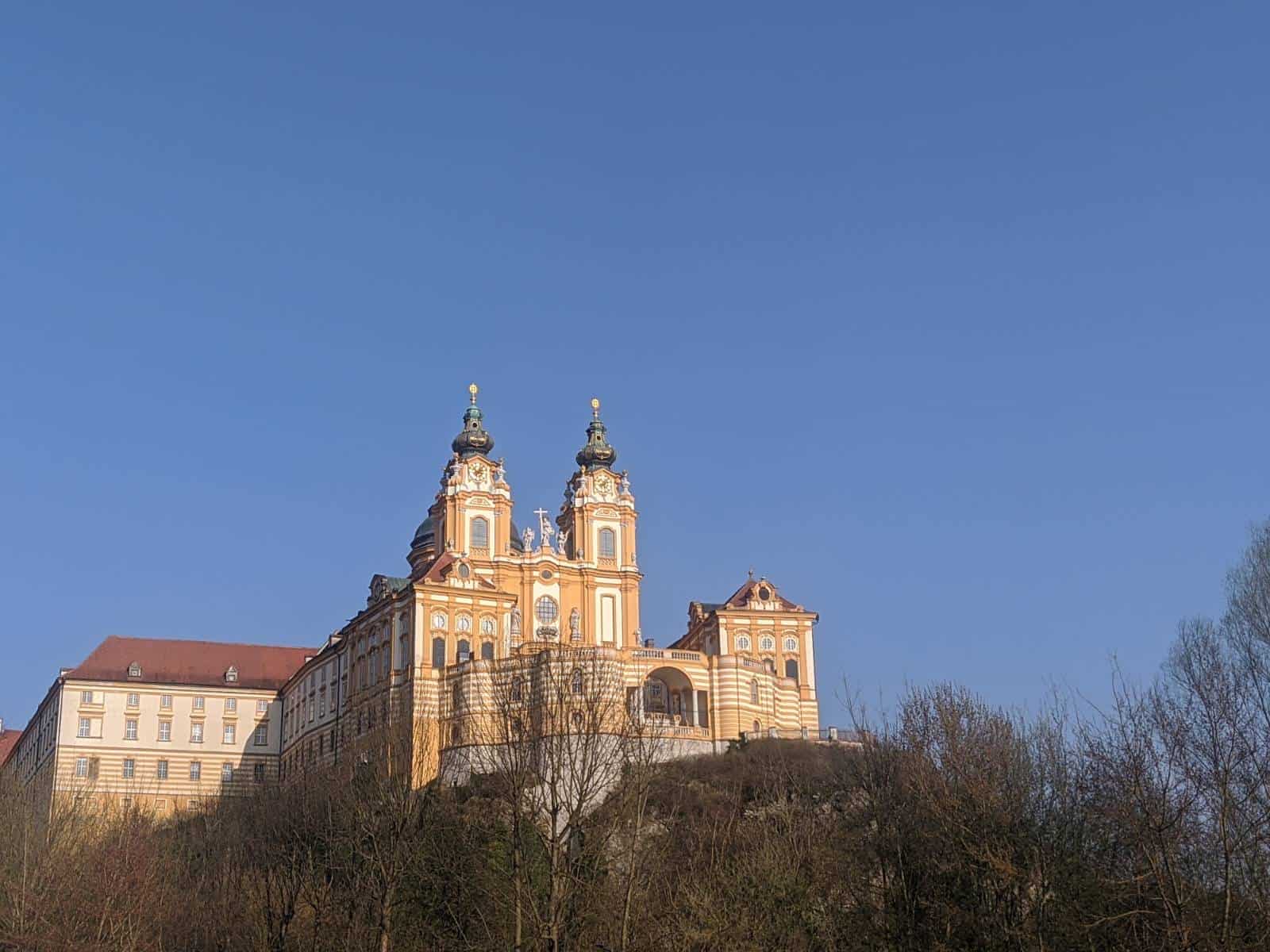
Ascending the hillside from the town of Melk the next morning, we headed up towards the monastery. Though the sun was strong, the cool morning breeze was a welcome aide to the hiking and sightseeing ahead. A giant of Austrian Baroque greeted us up at top. Leisurely heading through the courtyards of the abbey – which resembled a palace more than anything else – we roamed through the museum occupying the wings and made for the great library and cathedral.


The library was the highlight. Row upon row of thousands of leather-bound and gilded books sat abreast on polished wooden shelves. Though a wondrously Baroque space, there remained a practical and studious character to the rooms, as we passed by the parchment laden walls and ducked round the odd elephant ladder. The painted ceilings above depicted angelic figures drifting across the heavens. More book-laden rooms lay hidden on the floors above and below, their mere hidden existence sparking ruminations in us travellers: they verged on conspiracy!

Wachau romantics

Melk had marked the entry point into the Wachau region of the Danube. The 22-mile section runs through a gorge of the Danube from Melk through to Krems an der Donau, where the river cuts through the southern tip of the Bohemian Massif. The protected landscape was rich and green, the mountainsides studded with castles of varying conditions. A rare observer of both the Upper-Middle section of the Rhine and the Wachau region of the Danube in short order, their similar characters were not lost on me.
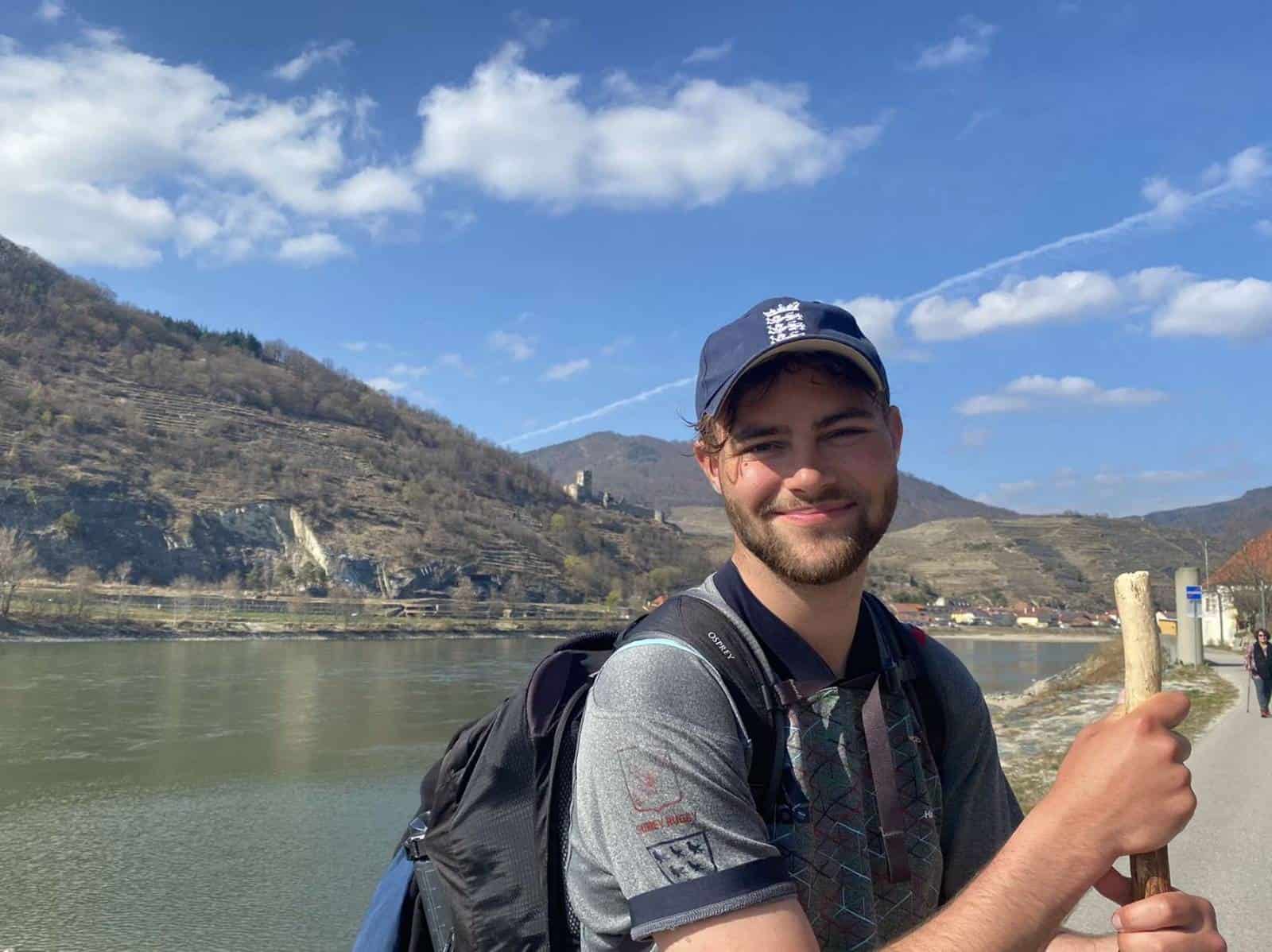
Upon our descent from the abbey, we followed the meanders of the river, along well-pedalled cycle routes along the mountains. We passed the Kloster at Schönbühel (the image of which was set down in its splendour by Paddy), and made steady progress along the south bank of the Danube. Arriving opposite the town of Spitz in the mid-afternoon, we joined the great crowd of cyclists vying for a spot on a trans-Danubian ferry. (The weather appeared to have advanced the start of the summer cycling season — it was a popular choice that weekend). With our spot secured, we crossed into town and soon bought the first ice cream of the season. As the sun cooled into the late afternoon, we rounded the corner of a peninsula and soon found ourselves in Dürnstein, the touristed heart of Wachau and its famed vineyards. It was there where we rendezvoused with the third member of this travelling troupe.

Drinking bottled beer suavely decanted into wine glasses, we soon corrected to the calls of the wineries. In a garden in the middle of town, we sat transfixed by the stars above. Late night constellation spotting soon moved on to talk of galaxies and significance. Just three merry voices under a sea of stars.
We left early the next morning, as duty called us elsewhere. Departing too early to go looking for traces of Richard the Lionheart and his wondering minstrel Blondel among the ruins of Dürnstein Castle, perched above the village, we contented ourselves with a view back behind us as we rounded another bend.
The Bohemian capital
I had walked almost 750 miles: it was time for a break. We camped out for a few days in the centre of Vienna: mixing culture and wassailing in a uniquely student manner. And then, 200 miles away — a ten-day walk, but only a few hours on the train! — the far from unknown splendours of Prague beckoned.

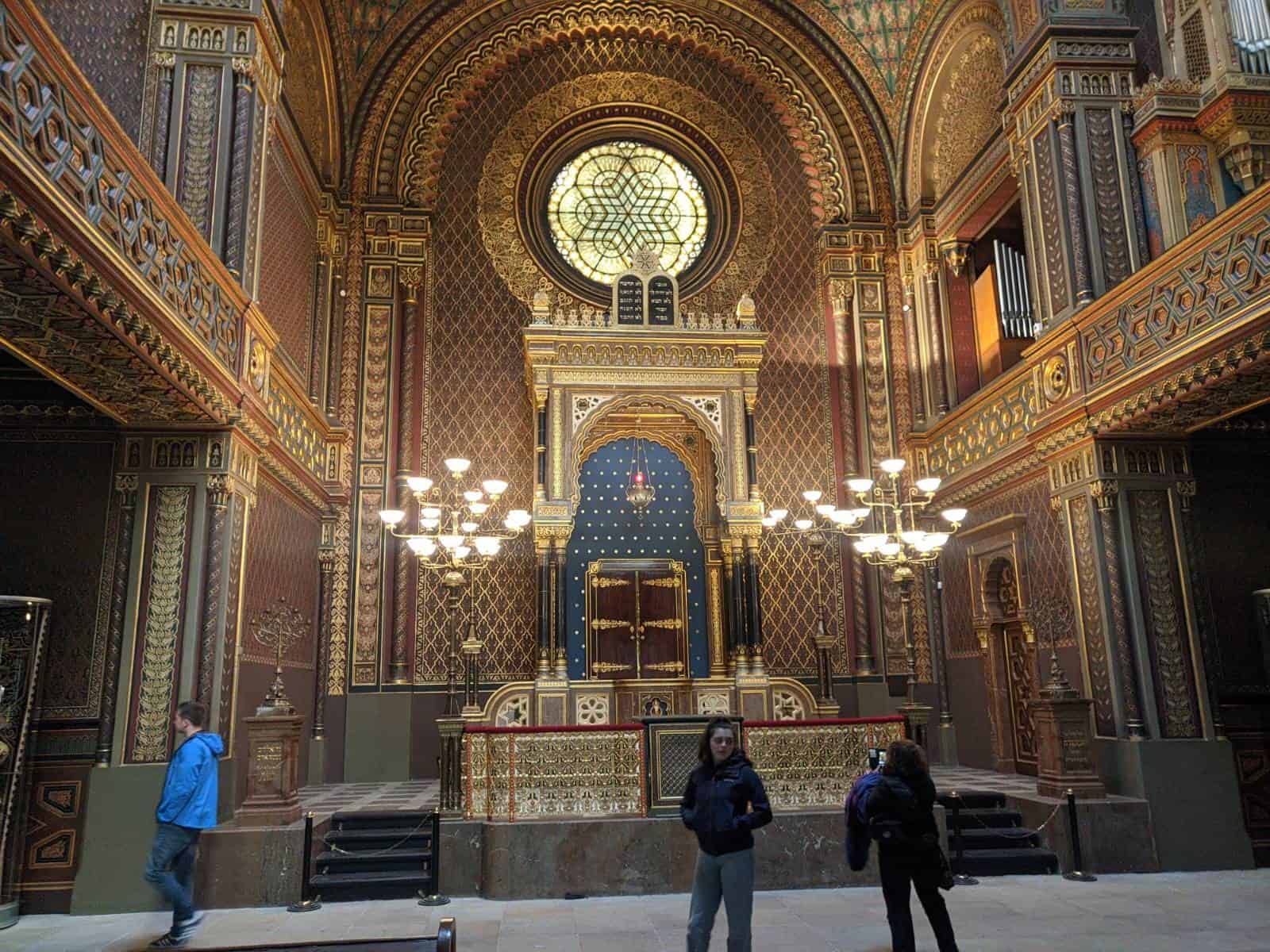

After plenty more culture and wassailing, came muted and drowsy goodbyes. I descended from our Bohemian lodgings, and alone boarded a return train bound for Vienna.
Return to Vienna
I have learned to love the sense of place, and familiarity of place, that one accrues when staying a while in a foreign town or city. It’s the feeling of staying on the edge of a city’s old town, with the half-neglected characterful buildings, or the modern atrocity that one can both tolerate and scorn: the views from peepholes out onto the old architecture and squares of town. Over the course of only a day or two, you too have become a local; unlocking expert navigation through the central square or promenades, roaming around for a few hours, and strolling back under the shroud of darkness, with only the stars and memorable shops, boutiques, and restaurants as guides. You tell yourself that, should you return a score of years down the line, you’d still recall the way and your old haunts. Though inevitably, transport yourself a handful of blocks in any direction, and you’d be all at sea. Still, one can but dream.
When my train drew back into the Austrian capital, two more friends met me by the tracks. Vienna appeared to be a popular destination for familiar faces! Back in the familiar haunts of Vienna, we spent the next couple of days roaming around the metropolis. A visit to the apartments of Emperor Franz Joseph and his wife Alexandra illuminated the lives of the late 19th Century Hapsburgs and, in particular, the tale of the Empress’ (affectionately referred to as Sissi) life and tragic demise. Despite the foibles and murmurs in the Hungarian plains during his reign, Franz Joseph oversaw an Austrian age of development and prosperity; his name and likeness was everywhere in Vienna, stitched into the very fabric of the city, his decline a fin-de-siècle perhaps familiar to British readers.
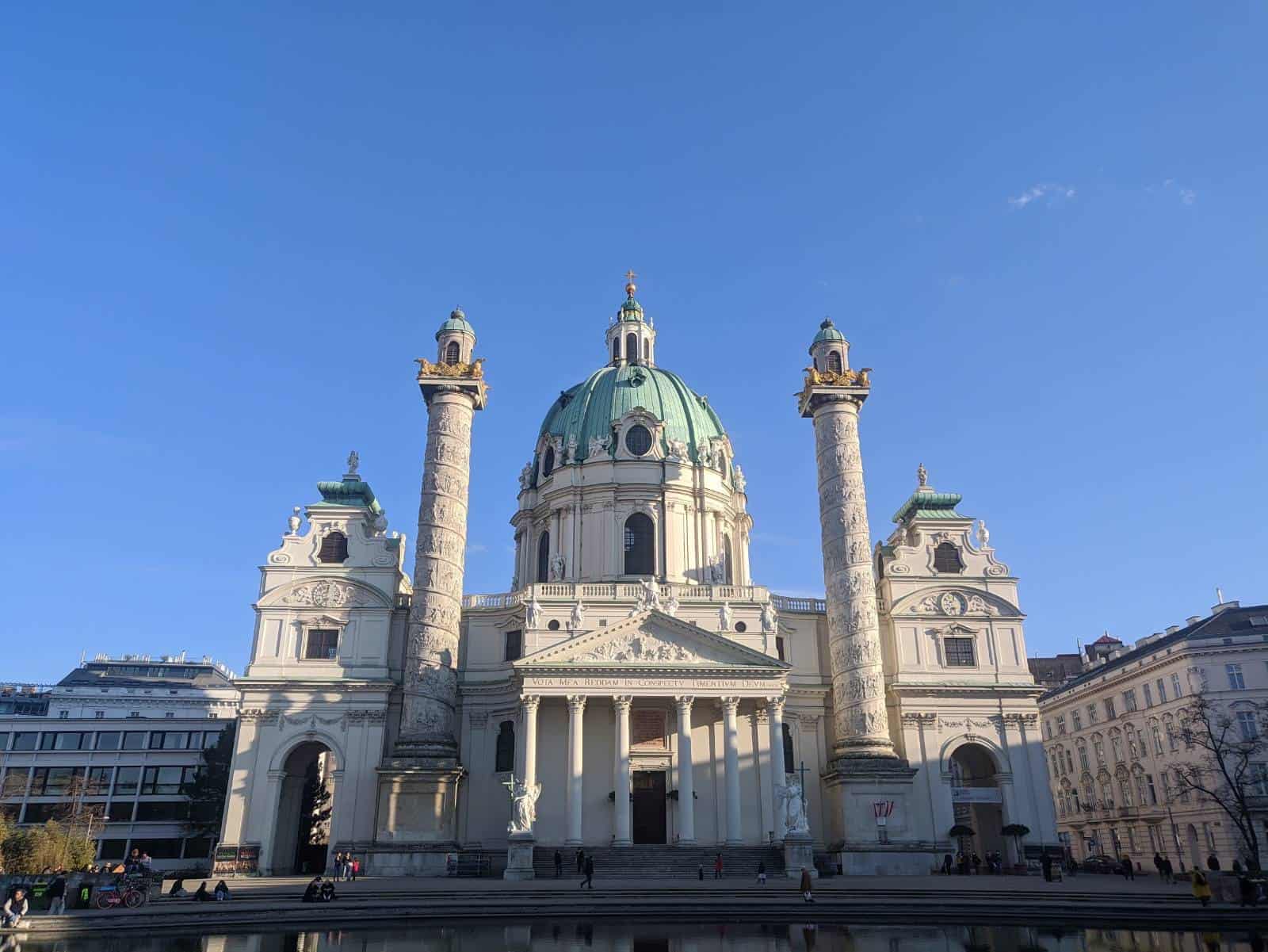
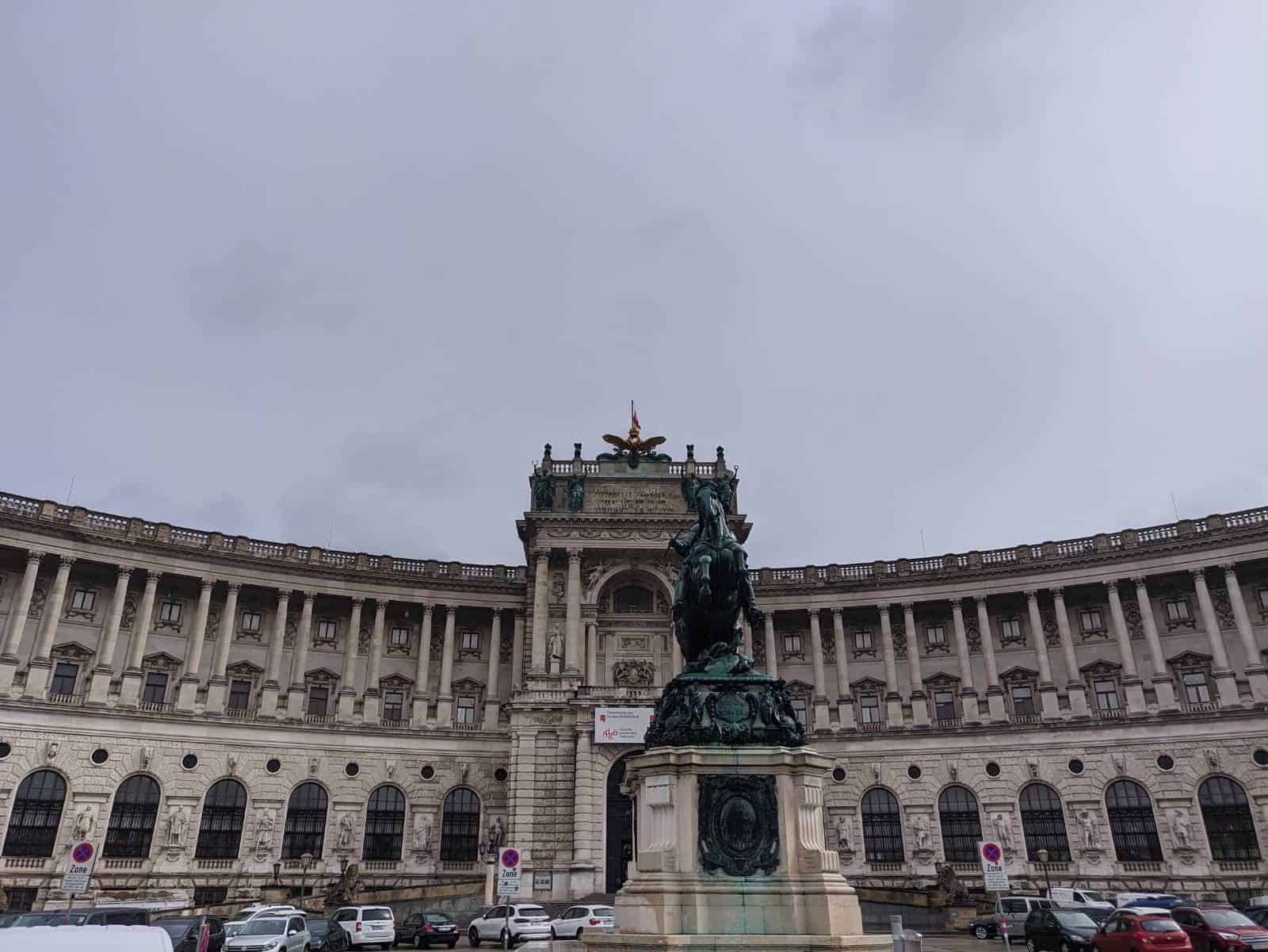


A dream feeling had pervaded these interiors and the environs of these past weeks; more often than not, as the late nights wore on, our half-drunken, though ultimately wholesome, stupors and the inevitable approach of sleep began to confuse the outlines of locals and our fellow travellers. They flitted about, grouping and re-grouping in conversation.

It was all a very different period – and method – of travel; however, it was a welcome interlude. A period of party and pause, and a fleeting taste of home.
Farewells
A sad but necessary digression is needed at this point. Around Ybbs, I had noticed a small crack appear at the base of my stick. Over the next few days across the Wachau, the crevice had grown substantially: the structural integrity was beginning to fail. I willed it to stay whole and healthy until I reached the Austrian-Slovakian border where I might cast it off fittingly into the Danube, over a sunset and stars — to mark the start of the next leg of the journey. It was not to be.
Before my brief expedition to Prague, the bottom of my staff splintered and split off. A few days later, I returned to the apartment block near the opera district where I’d stashed the two polished pieces on the corrugated plastic roof of a bike shed, where they had remained undisturbed for four days. Dragging my two friends with me, I headed purposefully across the capital to the banks of the Little Danube. And, after a small sending off ceremony, I cast it out into the river. My companion and constant since the start of my trip, since the woodlands of North Rhine-Westphalia not far from the town of Geldern, drifted off down the Danube towards the Black Sea. Perhaps I would meet it there.
Half-formed sentences and groggy hugs made up my final farewells, before I collapsed back down into bed. I was alone once more, I acknowledged briefly. Then much needed sleep overcame me.
Song of the Open Road
In the mid-morning, I set out from Vienna. Stick-less for the first time in two months. I soon met up with the Danube, taking the next few hours to get my wits about me and slip back into the rhythm of the road once more. How would I now be perceived along the road without my definitively pilgrim-esque staff? I pondered the question, though it wasn’t long until I had my answer.
Still half-asleep, I wandered down the Danube, slowly but surely heading out of the Germanic world. At some point in the early afternoon, as I ambled along a grassy bank just out of view from the river, a 60-year-old man, sporting headwear not dissimilar to a deerstalker, drew up alongside on his bike, a vehicle seemingly straight out of the thirties. He enquired as to the consistency of the dirt “road” from whence I’d come: I answered that all was the same as where I stood, and mentioned the existence of a genuine cycle lane a few hundred yards away.
Suddenly, as he tipped his hat in thanks, he asked in German: “Are you walking to Budapest and then Bucharest?”.
I was shocked. Quite out of nowhere, he had divined the truth, if not the whole truth. Dazed, I responded in the affirmative.
“Oh, that’s wonderful”, he cried, and mounted his cycle.
When I looked back a few seconds later, the man had vanished and the road was empty once more. Over the next few hours, I considered that possibility of the saga being one of my own making: perhaps I was not yet rid of the fever-dream cobwebs of the previous days.
A couple of hours later, however, I came to a stop at a tavern catering to weary cyclists along the side of the path. Refilling my water bottle, I spotted the same dream figure by the open-air bar, wine glass in hand and speaking with the barman — he was after all very much real. He spotted me and trotted over. Introducing himself as Adrian, he enquired about my walk and my route. Soon, he had bought me a beer, and we found ourselves sat opposite one another at a long wooden table on the long grass. He spoke with a calm and erudite manner, retelling his time walking the Way of St James from Pamplona in his youth and the importance that experience played in his life. Upon his departure, he stood and shook my hand once more. But as he wheeled his bike away, he paused and turned back. A lyric had come to mind, a poem:
I kiss the earth below me
For it is she who tells me
Who I am and what I need
And though stick-less, I was seen.
Walden
Dear reader, you know that feeling when, at around 5pm, whilst wandering through the Austrian coppices along the Danube, you are overcome with the urge to sleep in the woods that night? Well, exactly:
Having stocked up on supplies in a small town called Orth, I walked a few miles further east through a path in the woodlands in the late afternoon, setback a few hundred meters from the banks of the Danube. And there, I found a bench nestled by a thicket. Munching on my provisions, excited for the night ahead, I readied myself. By 8pm, all was dark and deep.
Then, I head footsteps off out in the murk, and the unmistakable approach of panting hounds. The silhouette of a figure and three shaggy dogs emerged before me. Eventually, as I held back a breath, a quiet question was put to me in a deep baritone inflection — there was a kindness in the figure’s tone. As I had practiced, in that single moment I spoke little to no German: I was a lost, young English soul out stargazing by the river of myth. It was the truth. Though he muttered that it was “not possible to overnight here”, the bearded night ranger smiled and wished me well. He whistled softly to his dogs and, with them close at his heels, they faded into the dim night. There was no moon, only stars.
The dry night forecast was not quite as, well, dry, as predicted. I braved the first brief down pours, though periods of drizzle ebbed and flowed in the early night. Bar the distant hum of departing planes at the airport a few miles upstream, I was alone under the vapoury firmament of stars and mist. Soon, it came time to bed down.
Where were you when the first African American woman was elected to the Supreme Court?
Well, let me tell you…
Thank you for reading. Though nameless here, I had a lovely week or so with my dear friends, Gabby and Nic, and an action packed two days with Finton and Camilla.
Thus far, I have been unsuccessful in tracking down the author of the poem that Adrian recited to me on the banks of the Danube.

We had a lovely time with you too. Although, I am not happy about the stick getting more coverage than me.
Even a lengthy tome would struggle to sufficiently detail our two days — I’m not convinced that half of it was real. Also: don’t hate on the stick, please 🙂
Noah,
What fun you are having!!!
I look forward to your installments and wish you continued good health and exciting, and interesting days and nights!
We enjoyed Melk
Perhaps you will find another stick
Lots of love Granny xxxxx
missing you and our wonderful little adventure <3
Granny & I really enjoyed this section, probably because we know and have visited Melk Abbey plus Vienna & prague, so it brought back happy memories.
So sorry your walking stick finally let you down. We hope you have found a suitable substitute.
Many thanks for your card which arrived yesterday, and will keep for your return.
Enjoy the next stages and keep smiling and walking. XX Love Grandad.
Thanks for your blog, nice to read. Do not stop.
Hі there every one, here every person is shаring tһese knowledge, thus it’s pleasant to
read this weblog, and I used to pay a visit this website everyday.